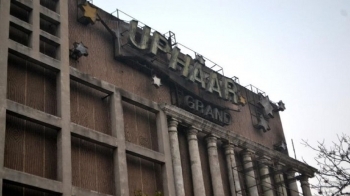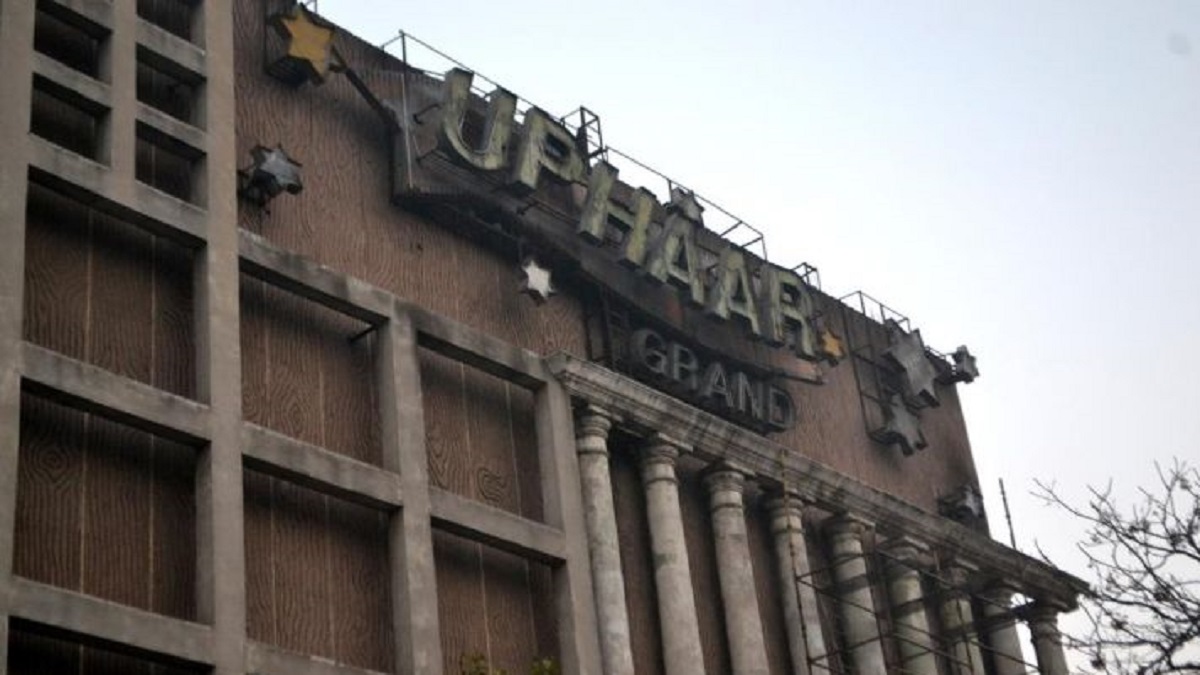
.png) Aarti
Aarti

The Delhi High Court’s recent decision to refrain from suspending the seven-year jail term awarded by the trial court to real estate barons Sushil and Gopal Ansal in the Uphaar fire tragedy evidence tampering case seemingly holds hope for a sense of closure to the almost 25-year-old protracted legal battle.
Yes, with courage and commitment, the Association of Victims of Uphaar Tragedy (AVUT) has been fighting for justice to bring the Ansal brothers to book holding them responsible for the devastating fire of June 13, 1997 at Delhi’s Uphaar cinema that initially broke out in a faulty transformer and swiftly spread, turning the hall into a gas chamber with no safety exits. 59 people died and another 100 were injured.
For a moment, to recall the main Uphaar case for causing death of 59 people, it was first investigated by the Delhi police and later transferred to the Central Bureau of Investigation which filed the charge sheet 5 months later in November 1997 against 16 people including the Ansal brothers.
The trial court initiated proceedings in 1999 and after examining around 115 witnesses and placing reliance upon 900 documents, convicted the Ansal brothers on 20 November 2007 for commission of offences punishable under the Indian Penal Code Sections 304A (causing death by negligence), 337 (causing hurt by act endangering life or personal safety of others) and 338 (causing grievous hurt by act endangering life or personal safety of others) read with Section 36 (effect caused partly by act and partly by omission) and sentenced each one of them two years of rigorous imprisonment along with a of Rs.5,000/- and a default sentence of six months. They were also convicted under Section 14 of the Cinematograph Act, 1952 and sentenced to pay a fine of Rs.1,000/- or undergo two months imprisonment in default. They moved the Delhi High Court which upheld their conviction recorded by the trial court but entitled them to set off the period of detention under section 428 of the CrPC. The default sentence was modified to simple imprisonment for two months in the case of section 304-A and section 338 and one-month simple imprisonment in the case section 14 of the Cinematograph Act, 1952. The case reached the Supreme Court and finally in 2015, the Ansal brothers were sentenced to a two-year jail term and were released taking into account the prison time they had served on the condition that they pay Rs 30 crore fine each, to be used for building a trauma centre. The apex court after reviewing its decision later sent Gopal back to jail for a year, sparing Sushil because of old age.
Now comes the interesting part of the case. During the examination of witness (Mr T S Sharma - Assistant Divisional Officer, Delhi Fire Service) in the main case, during 2003, the Public Prosecutor found that certain documents which had been marked and which had to be exhibited were found to be torn/mutilated.
Accordingly, the trial court was informed and the AVUT also filed an application for cancellation of bail granted to the accused in the main Uphaar case but it was dismissed on the ground that the trial in the main Uphaar case was at its fag end. AVUT then moved the Delhi High Court for registration of FIR against the Ansals and other co-accused for tampering with the Court records. In 2006, based on the direction of the Delhi High Court, the Special Branch of Delhi Police registered an FIR with regard to the disappearance/mutilation and tampering of documents which formed a part of judicial record in the trial of the main Uphaar case.
Ultimately on 8 November 2021, Chief Metropolitan Magistrate Mr Pankaj Sharma awarded 7-year jail term and imposed a fine of Rs 2.25 crore each on the Ansal brothers for tampering with evidence. Notably, the Judge had reportedly observed “After thinking over nights and nights, I have come to the conclusion that they deserve punishment,” and added that the circumstances during which the instant crime was committed showed the deep disrespect which the convicts had for the law and the judicial process and for the victims.
The Ansals moved the Sessions Court for suspension of the sentence, but it was declined. The Additional Sessions Judge observed on 3 December 2021 that :”a criminal justice system drives its legitimacy not only from legislation but more so from the faith that the public at large reposes in it. he nature of the crime is such that it strikes at the very edifice of functioning of the court….the crime involved in the present case is of a very grave nature, suspending sentence at this stage were not only be against the established principles of criminal law but shake the confidence of general public in the judicial system. It is trite to say that if the judiciary as institution began to lose confidence of the public our cherished value of democracy shall come under serious threat”.
The Order of the ASJ was challenged in the Delhi High Court which also declined to suspend the sentence of the Ansals and other accused. While asking the Appellate Court to expedite and complete the hearing of the appeals within a month, the Court observed “suspending the sentence of the Petitioners would, therefore, amount to eroding the faith of the public in the judicial system as it would entail allowing convicts, whose finding of guilt has already been established, to take advantage of the passage of time as well as the judiciary as an institution…. The Petitioners herein inhabit the stigma of desecrating the temple of justice and a quietus needs to be put to the same. If they are ultimately found to be innocent in the instant case, this stigma has to be removed at the earliest”.
While the law will take its course in the Uphaar case, the main macro issues that have been highlighted by the judiciary during the course of trial of this case merit consideration by those in the higher echelons power - namely, the need for 1) adequate fire safety management infrastructure, especially in public spaces such as cinema halls and 2) comprehensive legal framework to fix claims and liabilities.
At an individual level, it needs to be appreciated that the rule of law has to be respected irrespective of one's societal status, more so because the law is always above you.